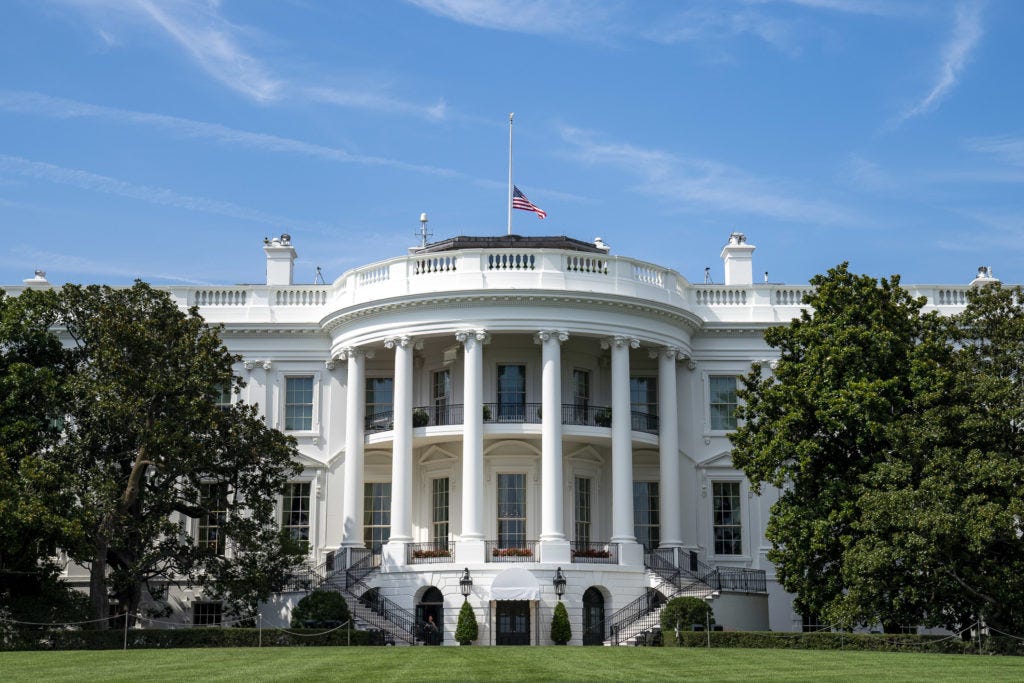Keys to the White House 2024
The "Keys to the White House" have correctly predicted the victor in every presidential election since 1984 except the 2000 election.

Elections raise an age-old question about the human condition: do we make our fate, or is our destiny determined for us? At a glance, the 2024 election is evidence in favor of determinism. After all, who would choose to have this lineup? Donald Trump’s primary voters are, to a large degree, responsible for the travesty in front of us, but there is at least a point in their enthusiasm that makes it more than a blind article of faith—he consistently leads in the polls.
The Real Clear Politics average has shown Trump in the lead over his successor for the last six months. This is significant because Trump did not lead Biden at any point in the 2020 election cycle. The implication is obvious: Biden’s performance in the White House has been a disaster. He can no longer look good from his basement.
Alas! Trump’s strength is likely an illusion. Polls are not the most historically accurate way to predict elections, especially when taken this early. Even late polls were notoriously off in the battleground states in 2016, 2020, and 2022. In contrast, models from historians and political scientists have had better results. One of the more famous models is the Keys to the White House, developed by the quantitative historian Allan Lichtman and the Russian scientist Vladimir Kellis-Borok.
The two made their model in the early 1980s, and Lichtman first used it to successfully predict Ronald Reagan’s reelection in 1984. Although this now seems like one of the easiest predictions to make, Lichtman made it in 1982, when Reagan’s reelection was far from certain amid a sharp recession. Lichtman is a staunch Democratic partisan, but he claims the system is not in the thrall of any party. His track record supports this claim: he has successfully predicted every presidential election since 1984 except 2000, which came down to 537 votes in Florida.
A final note before we get into the fun stuff—the Keys cannot tell you what the margin or map will look like on Election Day. They can only tell you who will win. Some of the Keys are also notoriously subjective. Fortunately, they are phrased in a way that encourages objective analysis.
The Keys to the White House are a set of 13 statements. If five or fewer statements are false, the incumbent party is expected to hold the White House. If six or more are false, the challenging party is expected to win it.
What do the Keys Say So Far?
KEY 1 (Party Mandate): After the midterm elections, the incumbent party holds more seats in the U.S. House of Representatives than it did after the previous midterm elections.
This key is false. The Republicans picked up seats and took control of the House of Representatives, albeit by the barest margin.
KEY 2 (Contest): There is no serious contest for the incumbent party nomination.
This key is true. Insurgent candidates would have needed to get at least one-third of the delegates at the Democratic National Convention to turn this against Biden.
KEY 3 (Incumbency): The incumbent party candidate is the sitting president.
This key is obviously true.
KEY 4 (Third party): There is no significant third-party or independent campaign.
We do not know the answer to this question yet. Biden’s dismal approval rating (about 41% in the RCP average as of April 3rd) and old age weigh heavily against him. Because this is, in so many ways, the election that nobody wants, third-party candidates have much more of a chance of disrupting the usual status quo in this cycle than in normal cycles. The most formidable is Robert F. Kennedy Jr. The No Labels organization had signaled they would field a ticket but chose not to. It’s unclear if other independent efforts may arise in the coming months. We will need to see how possible developments will affect the polls and the votes. TBD.
KEY 5 (Short-term economy): The economy is not in recession during the election campaign.
So far, so good for Biden. True.
KEY 6 (Long-term economy): Real per-capita economic growth during the term equals or exceeds mean growth during the previous two terms.
Again, so far, so good for Biden. True.
KEY 7 (Policy change): The incumbent administration affects major changes in national policy.
For better or worse, this key is undoubtedly true.
KEY 8 (Social unrest): There is no sustained social unrest during the term.
True. While there has been controversy over Gaza of late, it’s nothing that would come close to what would be needed to turn this against the incumbent.
KEY 9 (Scandal): The incumbent administration is untainted by major scandal.
Republicans have certainly tried to make something out of Hunter Biden. However, nothing involving him has escaped the conservative media bubble to make the general public think that a genuine scandal has come over the administration. Republicans’ efforts to impeach Biden have also been nothing more than theatrics, not least because they lack the votes to do it. It is almost certain that this key will remain true on Election Day.
Help us to continue to provide a platform for writers like Jordan Carpenter.
KEY 10 (Foreign/military failure): The incumbent administration suffers no major failure in foreign or military affairs.
Biden’s foreign policy has been a dumpster fire. The botched execution of the withdrawal from Afghanistan severely damaged American prestige.
It likely isn’t a coincidence that Putin decided to invade Ukraine during Biden’s tenure, either, and Moscow’s latest drives there are meeting with success. This is partially due to the slowdown in American aid and Ukraine’s dire shortage of ammunition. Still, much of the current state of the war comes down to Biden’s policies. By dithering in delivering weapons like Abrams tanks, ATACMS missiles, F-16s, and DPICM cluster bombs in the first year, Biden lost the best opportunity for a victory in Ukraine. Russia has since entrenched itself and adapted to developments on the battlefield, especially with drones and better security for its critical military infrastructure.
Finally, Biden has proven helpless in the Middle East. The war in Gaza is now six months old, with no end in sight. Biden’s policy has been incoherent and made even more indecisive thanks to the leftward turn of his party. The result is that Biden can neither support the removal of Hamas from power in Gaza nor exert the pressure necessary to force Israel to change its behavior and come to a settlement. Meanwhile, the wider region has erupted in flames. However, his response to the attack on American troops at Tower 22 at the end of January was largely commendable.
I suppose this is a long way of saying that this key will almost certainly be false on Election Day, a fact Lichtman himself concedes.
KEY 11 (Foreign/military success): The incumbent administration achieves a major success in foreign or military affairs.
Nothing here. False.
KEY 12 (Incumbent charisma): The incumbent party candidate is charismatic or a national hero.
False. Nothing more needs to be said.
KEY 13 (Challenger charisma): The challenging party candidate is not charismatic or a national hero.
While Donald Trump knows how to put on a show far more than Biden does, he does not turn this key against the incumbent. According to the Keys model, the candidate must have a broadly popular appeal to be a charismatic candidate. Donald Trump is one of the most disliked politicians in the country, whose favorability ratings have never exceeded 50% except in a few outlier polls over nine years. This key is true.
Adding up, that’s four false keys, eight true ones, and one to be determined. Biden is cutting it close and doesn’t have a lot of room for error, but is still favored for reelection according to this model.
In his overview of the lay of the land for 2024, Allan Lichtman notes:
“Whether or not the sitting president is seeking reelection, the American electorate chooses a president according to how well the White House party has governed the nation, as measured by the consequential events and episodes of a term. Nothing a candidate has said or done during a campaign, when the public discounts everything as political, has changed his prospects at the polls. Debates, advertising, television appearances, news coverage, and campaign strategies—the usual grist for the punditry mills—count for virtually nothing on Election Day.”
This may sound like a deterministic statement. The idea that someone who has performed as poorly as Biden is favored for reelection is depressing and suggests a lack of free will among the voting public. However, Republicans have also chosen to become a party based around a theatrical personality cult. In many ways, Biden is a default candidate and a default President—not good, but at least he feels more normal than the alternative. In a contest between governance and chaos, governance of any kind usually wins.
At the very least, if elections are mostly pre-determined before the campaign, it gives one an excuse not to follow exhausting political coverage, which is usually for the betterment of one’s mental state, especially this year amid the election that no one wants.
Jordan Carpenter received his BA in Political Science from Fordham University in 2011, with coursework in international law, political theory, and political ethics. He was Assistant to the President at New York Civic, under Henry Stern, from 2012 to 2017 and is currently a script writer for The Military Show on YouTube.




I could consume content like this all day! Love the keys but there is an X factor this year, uncharted waters. Let's say we use all of the circumstances noted above, improve economy, no massive unrest, no uber charasmatic guy like Reagan on the GOP side, and then imposed the five last Dem Presidents - Obama, Clinton, Carter, Johnson and Truman. The difference is that all of these men were in their 40s or 50s with one exception. Truman was 68 years old when he LEFT office-and was still 13 years younger than Biden is today. Agedeness may be needed as a 14 key.